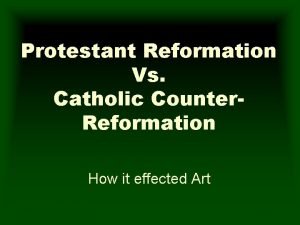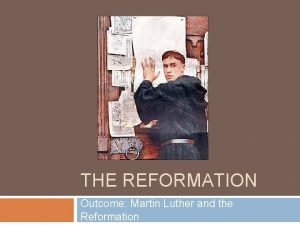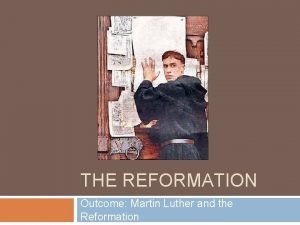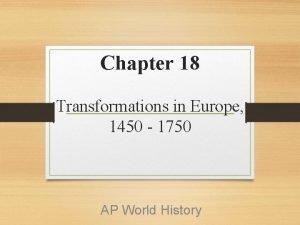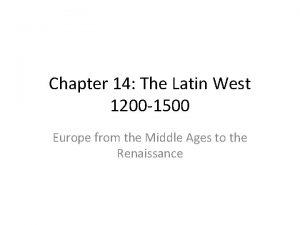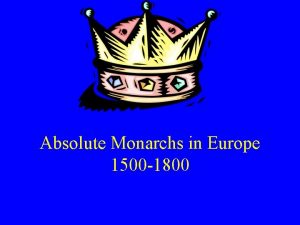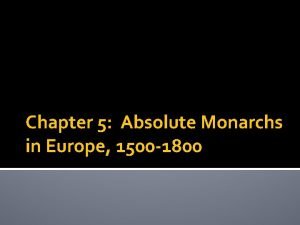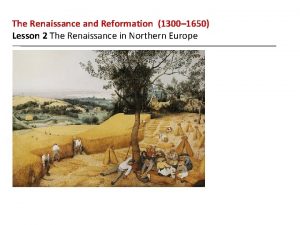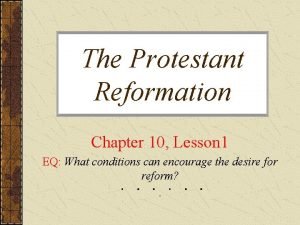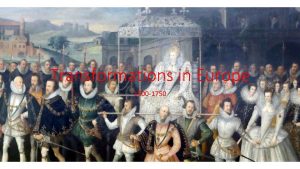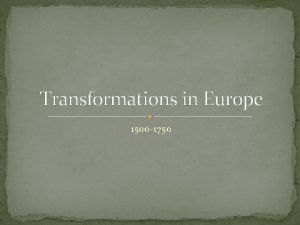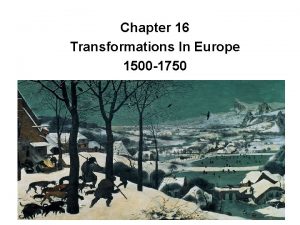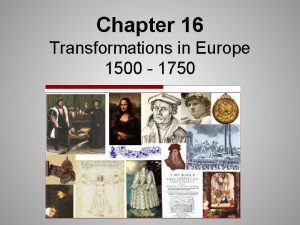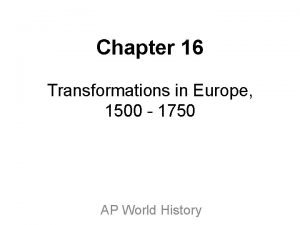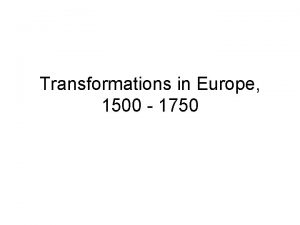Transformations in Europe 1500 1750 Religious Reformation Down











- Slides: 11

Transformations in Europe 1500 -1750

Religious Reformation Down with the Pope! No more Catholics!

Martin Luther has a problem with indulgences Catholic church (Pope Leo X – Medici guy) was selling to build St. Peter’s in Rome. Faith alone will get you to heaven, not good works. Printing press helped spread his problems and got other Germans to think of getting rid of the Italian Pope. https: //www. youtube. com/watch? v=Fh. GGj. Rjvq 7 w Henry VIII – wanted a divorce and to get rid of the influence of the Catholic Church over England. https: //www. youtube. com/watch? v=3 EGz. Hsye 71 c John Calvin – Calvinism who become Presbyterian. Pre-destination – God already knows where you are going so you are predestined to Heaven and Hell. Faith over good works and simple churches and vestments. Catholics respond: Council of Trent reaffirmed the surpremacy of the pope (what the pope says usurps the Bible), seven sacraments ( Baptism, Confirmation, Eucharist, Penance, Anointing of the Sick, Matrimony, and Holy Orders), Jesuits (Society of Jesus – go out and preach and teach and get new members, form the Inquisition group, (get those heretics!), some papal reforms (have to have seminaries to train priests, bishops must live in area, reform the pope’s office and duties) Catholics and Protestants start killing each other with “wars of religion” for a couple of hundred years. See map page 408.

New Ideas Leonardo Rafaello • Renaissance – Starts in northern Italy, spreads to northern Europe. Rebirth of society. • 1. Increase in wealth in urban settings to spend on nice stuff • 2. Recovery from feudalism and the Plague and return to Greek and Roman ideals • 3. Humanism – Man has an unlimited ability to achieve. Become more secular (away from religion) and based on individual talent to pursue what one wants. • Think Ninja Turtles! • Books now being written in your own vernacular, leads to increase in literacy and decrease in price due to printing press. Donatello Michelangelo

New Ideas Scientific Revolution – Eureka! The Greeks were not correct but were – the workings of the universe could be explained by natural causes Isaac Newton

New Ideas The Enlightenment – let’s put science to human conditions – how can we make life better for everyone? Thomas Hobbes – Leviathan. Man is bad and needs a strong government to rule. John Locke – man is born free with a blank slate. Government’s job is to protect his property. 3 jobs of Government – police, army and public works Montesquieu – Separation of Powers – 3 Branches of government – Executive, Legislative and Judicial Voltaire – Religious toleration Diderot – Printed an encyclopedia with all this information Adam Smith – Laisse Faire economics – allow a man to pursue his goals and he will create wealth Beccaria – cruel and unusual punishments will not be tolerated Rousseau – social contract. We agree to be ruled by the general consensus (majority rules) and rulers are there because we allow you to be the ruler. If you don’t do your job is it our duty to overturn you. Mary Wollstonecraft – 1792 – Women should be included in these rights, not just men. Of course, Absolute rulers hate this, but the printing press and growing literacy spread new ideas by wildfire.

Social Mobility - more people moving to cities, London over 500 k by 1500. The Bourgeoisie were a new French wealthy middle class that dominated the trade activity in and out of Europe. The Dutch had an especially successful Bourgeois class, in the 1600 s dominating more than half of all ocean trade in the world. The accomplishments of these Dutch bourgeois led to the development of new banks, along with new ship design and tech. - These Bourgeois used new concepts like joint stock companies and stock markets to further increase their wealth, sometimes so much that they were able to elevate their social status to that of a gentry. Initially the slave trade led to some slaves going to Europe, but by 1600 most slaves went to the Americas. Although still reliant on forced labor, Europe now had that labor overseas. - the life for peasants in Europe was hard, often suffering from famine until the 1700 s when crops like corn and potatoes established themselves, helping the poor starve far less often. (irony that the poor who ate it grew wheat for a living but were too poor to afford it. - the rich drank wine, but the poor drank beer. Other jobs included mining, lumberjacking, and making charcoal, all of which led to heavy deforestation. This leads to early laws that protected certain forests in England France. - Many of the poor went in search of work into towns and cities, but once there had trouble finding work, leading to rises in prostitutions, gangs, and crime. Many saw these cities as a glimpse of the massive gaps between the rich and the poor. This gap led to many peasant rebellions (1525 in the Alps, France in 1590 and 1670 and 1715) (I smell revolution!!)

“Women and Family” 417 -418. Describe how life is changing for women in Europe in the 16 th – 18 th centuries, using specific details from the section provided. - women were below men, but what really mattered was the class and wealth of said woman (rich woman has better life than poor man). Marriages were later in Europe than in other parts of the worlds because of the vast majority of people in the labor force/education – 20 s instead of teens. - prostitution and rape were common - most schools, guilds and professions prohibited female involvement. Despite this, many women were involved in bookkeeping, poetry, art, and music.

Political Power Europe – no one unified empire for whole of Europe. However, parts join up due to dynastic mariages. Holy Roman Empire – All under Charles V from Austria but includes Spain and the Netherlands, parts of German territory and Italy. Charles wanted to protect Christian Europe from Ottoman Mulim invasion and did stop them at Vienna in 1529. However Lutheran Princes and Catholic Charles started arguing over religion and the German Wars of Religion led to Charles abdicating to multiple heirs and the Peace of Augsburg (1555) where German princes could choose Lutheran or Catholic. Spain and France both stay dominantly Catholic. English Kings fight over rights and Parliament wins and the Divine Rights of Kings is gone and parliament must be included in decisions. Kill King Charles, put in a puritan Charles Cromwell who is worse, get rid of him. Bring back a Catholic, get rid of him by inviting his Protestant daughter and her husband, William and Mary of Orange (Dutch) back in a bloodless revolution as long as they agree to rule with a Bill of Rights for the people.

WARS 1526 -1571 Ottoman Wars – stopped at Vienna 1546 -1555 German Wars of Religion – protestant (Lutheran) and Catholic 1562 -1598 French Wars of Religion Protestant (Hugenots) vs Catholics 1566 -1648 Netherlands Revolt – protestant (Calvinist) vs Spanish Catholics All of these lead to 30 Yrs. War 1618 -1638 – Thirty Years War – Started in area of the Holy Roman Empire over religion – killed 8, 000 in German area. Ended up including most of Europe as either Catholics or Protestants. England has a civil war, Russia rising and beats Sweden, Dutch and British fight over supremacy of the seas, Louis XIV takes it out on protestants and removes the tolerance of his grandfather’s Edict of Nantes which gave the Huguenots rights and ability to work in government. All these wars lead to several things: High taxes to pay for them Treasuries being used for war Better trained armies Better weapons Better command structures Intolerance Requiring one religion led to expulsion of other contributors such as Muslims and Jews

Meanwhile in Europe Absolute rulers continue to rule single handily. Claim “Divine Right of Kings” – I am answerable only to God. Spain, France, Austria, Russian and parts of Germany all have absolute rulers. Louis XIV of France best example of the control and excess with his Palace of Versailles. Different European areas keep the other at bay not allowing any one state to gain too much control of Europe as a whole. Alliances begin to take on geo-political rather than religious reasons.
 Catholic reformation vs counter reformation
Catholic reformation vs counter reformation The reformation outcome martin luther and the reformation
The reformation outcome martin luther and the reformation The reformation outcome: martin luther and the reformation
The reformation outcome: martin luther and the reformation Europe 1450
Europe 1450 Renaissance europe 1500 map
Renaissance europe 1500 map Characteristics of absolute monarchs
Characteristics of absolute monarchs Europe 1500
Europe 1500 America africa and europe before 1500
America africa and europe before 1500 Absolute monarchs in europe 1500-1800
Absolute monarchs in europe 1500-1800 Lesson 2 the renaissance in northern europe
Lesson 2 the renaissance in northern europe Chapter 3 lesson 1 the protestant reformation
Chapter 3 lesson 1 the protestant reformation Can you hear it the sound of heaven touching earth
Can you hear it the sound of heaven touching earth
